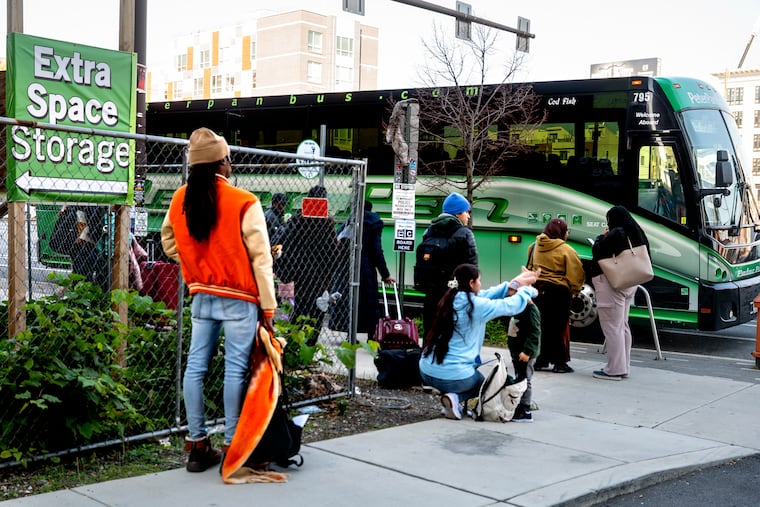Greyhound, Megabus passengers with disabilities were an ‘afterthought’ at new Spring Garden terminal, advocates say
With no bathrooms, hard-to-read signs, and bumpy cobblestones, Philly's new Spring Garden bus terminal is hard to navigate. For people with disabilities, 'it's honestly ridiculous,' advocates say.

Philadelphia’s new temporary boarding area for intercity buses on Spring Garden Street presents an “astonishing” array of barriers for people with disabilities, according to a review by a disability-rights organization and several public transportation watchdog groups.
The activists are calling on the city, which is in charge of the site, to work with bus carriers to make it more accessible.
“We’re always an afterthought, never a before-thought,” said report coauthor Latoya Maddox, a leader of the activist group Disabled in Action who uses a wheelchair.
Problems identified included a lack of accessible restrooms (or any, so far); signs and maps that are hard to decipher for people with low vision and don’t have braille for blind travelers; and a designated drop-off area for Uber, Lyft and taxis that is paved in bumpy cobblestones, making it hard for those with mobility issues to navigate.
Greyhound, Flixbus, Peter Pan Bus Lines, and Coach USA, which operates Megabus, have been using the easternmost blocks of Spring Garden Street since Nov. 16 as an open-air terminal, boarding and unloading buses at curbside as people queue up on the sidewalks. There are no seats or shelters there.
“The setup was not strategically walked through or talked through. The city didn’t consult the disability community,” said Maddox, senior independent living specialist with Liberty Resources Inc., a nonprofit that provides service.
Temporary, again
An earlier temporary home for the buses on the 600 block of Market Street snarled traffic, caused SEPTA to skip stops on three transit bus lines, angered nearby businesses, filled the no-stopping zone in front of the federal courthouse with vehicles dropping off passengers — and became an embarrassment for the city.
Officials in the city’s Office of Transportation, Infrastructure and Sustainability share the goal of a more accessible intercity bus site and are reviewing the survey findings, the agency said in a statement. “We welcome all feedback as we continue to navigate this process,” it said.
Plans call for the bus carriers to use the new base of operations through March 31 as they and the city work to find a more appropriate and permanent place for an intercity bus station.
Greyhound abruptly closed its shared Filbert Street station in late June, a cost-cutting move that has become common in the industry — and one that forced the city to find accommodations for long-haul buses and thousands of passengers on short notice.
‘Existing in limbo’
“It’s honestly ridiculous,” said Micah Fiedler, coauthor of the accessibility review and a public transportation advocate with the urbanist group 5th Square. He said the underlying issue is a long failure to plan for and establish a convenient bus station located at a transit hub.
“There should be a modern city bus terminal, funded by taxpayer money,” Fiedler said, noting stations in Boston, New York, and Washington that also receive usage fees from bus companies. “The city of Philadelphia seems content existing in limbo.”
He and others believe the logical place is 30th Street Station. Indeed, Amtrak’s plan for renovations calls for a permanent intercity bus depot connected to the station, but that prospect is some years away.
In some respects the Spring Garden site is an improvement on its temporary predecessor. It has clearly marked boarding areas for the different bus companies. There are 16 bench seats in a small waiting room for Greyhound and Peter Pan customers around the corner on North Columbus Boulevard.
But touches that would meet the accessibility requirements of the Americans with Disabilities Act (ADA) are missing, the report found. There is no automatic door opener for the entrance of the waiting room, the ticket counter is placed too high for wheelchair users to comfortably communicate with employees, and a ticket kiosk does not have options for audio or large print.
Representatives from Disabled in Action and 5th Square examined the site on Nov. 20 and 26. Separate observations by members of the Transit Riders Union also were incorporated in the report, the authors said.
Other concerns noted in the report: Noble and Front Streets, where portable restrooms area planned and there is a drop-off zone are paved with cobblestones, which are slippery when wet and difficult for people with mobility issues to negotiate.
Maddox said she hoped the city and bus companies would make improvements and “think about the disabilities community” when picking the next site.